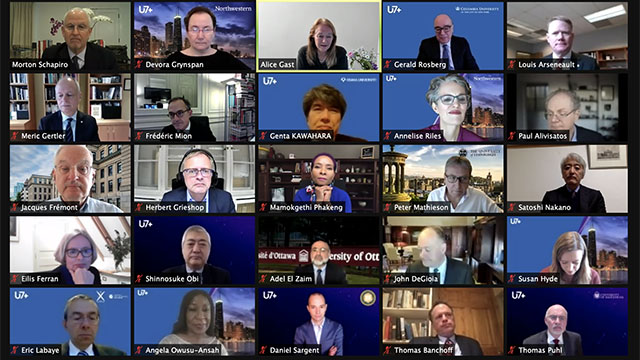This year’s virtual U7+ Alliance of World Universities Presidential Summit brought together nearly 100 university leaders from six continents for a series of dialogues on intergenerational justice as students worldwide call on higher education institutions to play an active role in addressing the global challenges they will inherit.
University leaders unanimously voted to work together and with government leaders worldwide to create new opportunities for mutual understanding and equitable resource sharing across generations. This builds on previous U7+ Alliance commitments to tackle climate change, promote ethical uses of artificial intelligence and digital technology and address other global issues.
"Our students increasingly feel a sense of generational imbalance in terms of who will pay the price for decisions made, or not made, by policymakers today,” said Ian Kelly, Northwestern University Ambassador-in-Residence and former U.S. Ambassador to Georgia and the Organization for Security and Cooperation in Europe. “As their elders postpone effective action to address issues like the climate crisis, mounting debt, economic inequity and racial injustice, the younger generation senses keen injustice: It is they who will have to face the consequences of action deferred.
“We all must understand this will negatively impact the democratic system that unites the G7 nations. At best, political apathy, and worst, support for other political ideologies, follow when a generation feels the present system does not allow them more participation in determining their own future.”
The U7+ Presidential Summit is the annual meeting of the U7+ Alliance, the first coalition of university presidents from Europe, Asia, North America, South America, Africa and Australia dedicated to defining concrete actions universities can take to collectively address global challenges in coordination with government leaders in G7 countries and beyond.
Northwestern hosted the U7+ Presidential Summit this year in partnership with Columbia University, Georgetown University and the University of California, Berkeley. This marks the first time a U.S. institution hosted the U7+ Alliance, which French President Emmanuel Macron helped launch last year at Sciences Po.
“We recognize the many challenges facing youth around the world and understand that many of the most urgent ones are matters of intergenerational justice,” said Northwestern University President Morton Schapiro. “As a global alliance of universities, we have a responsibility to advocate on behalf of young people and make their voices central to the addressing of global challenges.”
This year’s U7+ Summit followed the first U7+ Worldwide Student Forum, where students from countries including Ghana, Morocco, Canada, the U.S., UK, Italy, France, Germany, India, Singapore, Korea and Japan shared their views on how universities can better prepare them for active engagement in efforts to address global challenges.
“Together as a group of U7+ student delegates, we ask, ‘What if learning to listen with an open mind and respectfully respond to another’s point of view was just as important as defending and supporting your own position in an article or dissertation,’” said University of Ottawa student Rachel Leistra.
Leistra and other students’ voices inspired the 2020 U7+ Presidential Summit’s focus on intergenerational justice, and will continue to inform the work of the U7+ Alliance.
“The interests and rights of youth in these conversations will be critical to our collective ability to address future global challenges,” said Madeline Baxter, a junior at Northwestern who participated in the Summit. “This is only the beginning of such important conversations.”
With the contributions and recommendations of youth voices, the U7+ Summit culminated in participating universities agreeing to a formal commitment to address intergenerational justice through direct engagement with the G7. Summit participants were unanimous in their agreement that universities have a unique responsibility to prepare the next generation for global leadership, and the U7+ Alliance provides a unique platform to bring the interests of youth to the attention of the G7 and other multilateral organizations.
In focusing on intergenerational justice, the U7+ Alliance will ask policymakers to look beyond short-term election cycles and toward the long-term interests of all their citizens.
“The U7+ Alliance will use its platform to advocate for the interests and rights of youth and future generations through a three-pronged approach involving actions on our campuses, global information campaigns and direct engagement with policymakers,” said Annelise Riles, Associate Provost for Global Affairs and Executive Director of the Roberta Buffett Institute for Global Affairs at Northwestern University. “We will encourage government leaders to take a longer view of the global challenges and opportunities we face in the realms of climate and energy, emerging technologies like artificial intelligence, the global COVID-19 pandemic and more.”
Imperial College London, the London School of Economics and Political Science, the University of Cambridge, the University of Edinburgh and University College London will cohost next year’s Summit set to take place in the UK and advance the U7+ Alliance’s work to foster intergenerational justice.
Read the U7+ Alliance's full collective statement on the importance of intergenerational justice here. And watch the U7+ Summit livestream video here.
About the U7+ Alliance
The U7+ Alliance is the first international coalition of university presidents aimed at structuring and advancing the role of universities as global actors across the multilateral agenda. Alliance members meet annually to establish a common agenda and identify key areas for coordinated action. Together, U7+ university presidents take stock of their universities’ unique civic and social responsibilities and pledge concrete action on behalf of their institutions to address the world’s most pressing challenges at local, regional and global levels.


